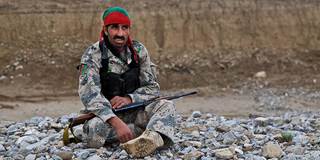It’s been 14 years since US President George W. Bush declared a “global war on terror.” Now that another president – François Hollande of France – has also declared war on terror (as have other European leaders), are the prospects for victory really any better?
LIMA – It’s been 14 years since President George W. Bush declared a “global war on terror.” Today, after spending $1.6 trillion on that war and killing 101 terrorist chieftains, from Osama bin Laden to “Jihadi John,” the West remains just as vulnerable, if not more so, to extremists who can recruit fighters and strike any Western capital virtually at will. Now that another president – François Hollande of France – has also declared war on terror (as have other European leaders), are the prospects for victory really any better? I have my doubts.
It is time to consider that the strength of our opponents derives, at least to some degree, from sentiments similar to those that animated the American Revolutionary War and the French Revolution: frustration with and alienation from the prevailing system. In Britain’s American colonies before 1776, and throughout France in the years leading up to 1789, ordinary people became convinced that their lives, assets, and businesses had been subject for too long to the predations of arbitrary rulers. That same estrangement is felt nowadays in the Middle East and North Africa.
After all, the Arab Spring began when a poor Tunisian entrepreneur, Mohamed Bouazizi, set himself on fire in December 2010 to protest the merciless expropriation of his business. He committed suicide – as his brother Salem told me in an interview recorded for American public television – for “the right of the poor to buy and sell.”

LIMA – It’s been 14 years since President George W. Bush declared a “global war on terror.” Today, after spending $1.6 trillion on that war and killing 101 terrorist chieftains, from Osama bin Laden to “Jihadi John,” the West remains just as vulnerable, if not more so, to extremists who can recruit fighters and strike any Western capital virtually at will. Now that another president – François Hollande of France – has also declared war on terror (as have other European leaders), are the prospects for victory really any better? I have my doubts.
It is time to consider that the strength of our opponents derives, at least to some degree, from sentiments similar to those that animated the American Revolutionary War and the French Revolution: frustration with and alienation from the prevailing system. In Britain’s American colonies before 1776, and throughout France in the years leading up to 1789, ordinary people became convinced that their lives, assets, and businesses had been subject for too long to the predations of arbitrary rulers. That same estrangement is felt nowadays in the Middle East and North Africa.
After all, the Arab Spring began when a poor Tunisian entrepreneur, Mohamed Bouazizi, set himself on fire in December 2010 to protest the merciless expropriation of his business. He committed suicide – as his brother Salem told me in an interview recorded for American public television – for “the right of the poor to buy and sell.”